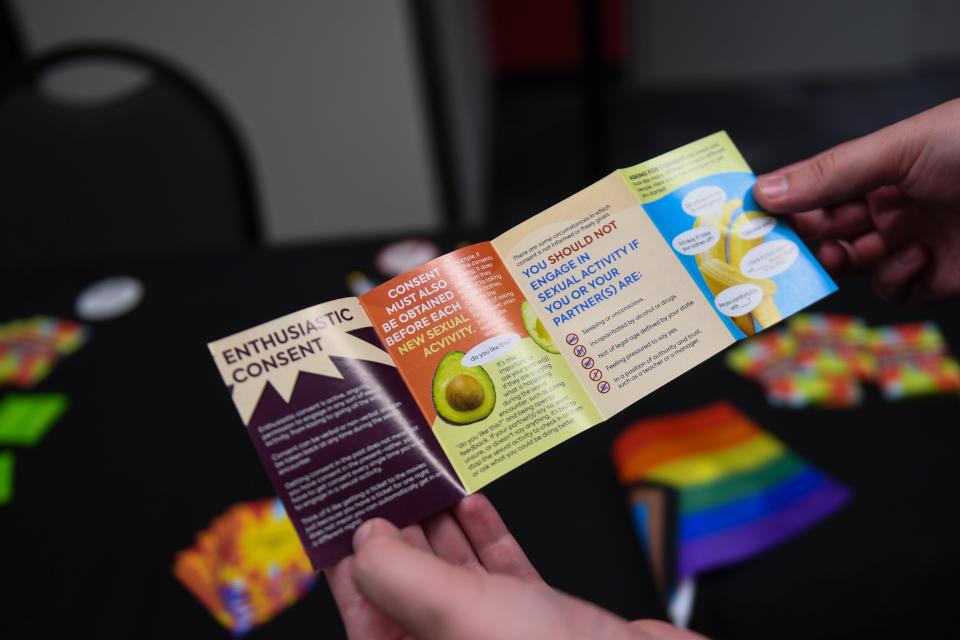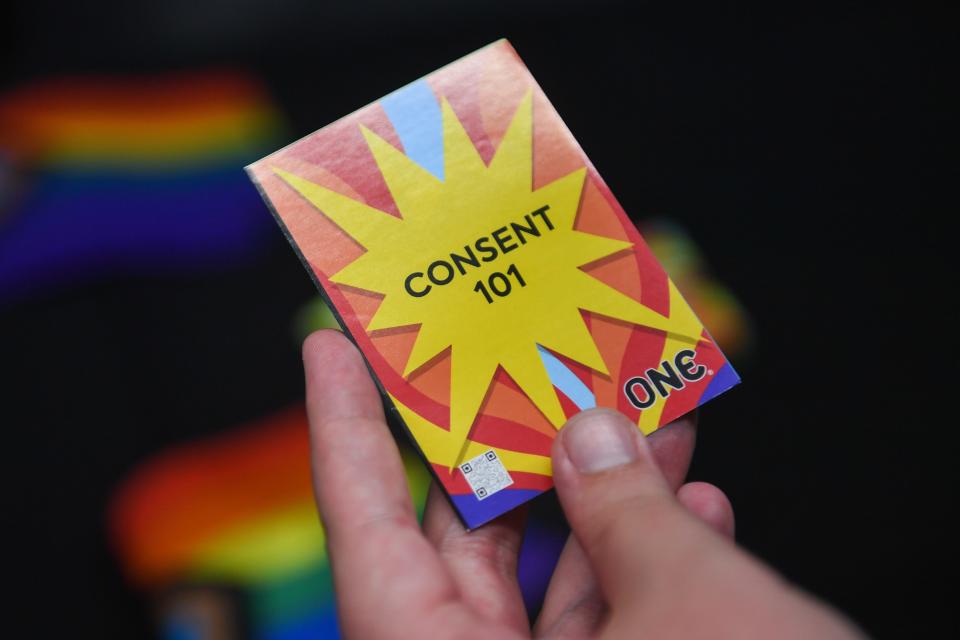How South Dakota colleges are educating about consent with new laws in place
Editor's note: This story features descriptions of sexual assault. If you or someone you know has been sexually assaulted, please reach out to either the Compass Center (605)339-0116, the Children's Inn (605)338-4880 or the Sioux Falls Police Department (605)367-7212. Sexual assault exams are available at hospitals in Sioux Falls as well as The Link downtown.Another sexual assault was reported at the University of South Dakota earlier this week, marking the sixth such incident this semester at USD since classes began Aug. 21.
It’s also been more than three months since two new state laws further defining consent and sexual assault went into effect. A legal definition of consent was not established in South Dakota until last legislative session, defining in state law what consent is and that sex without consent is indeed rape, previous Argus Leader reporting shows.
The newest definitions added to law now offer an additional legal mechanism for survivors of sexual assault who freeze and are unable to fight back during their attack. Sex without consent became a Class 3 felony, punishable by up to 15 years in prison and a maximum fine of $30,000 in July.
About the bills: South Dakota gets closer to defining 'consent,' creating new rape penalty
As sexual assault (SA) survivors continue to disclose what happened to them and with the new consent laws now in place, the Argus Leader wanted to help the public better understand how South Dakota universities educate students about consent, and what kind of training is provided before they get to campus or when they move in.
All college students and university employees must take SA prevention education, according to the 2014 Violence Against Women Reauthorization Act, but each campus chooses different trainings to offer to staff and students.
The education and training staff and students receive must include:
A statement that the institution prohibits the offenses of SA, domestic violence (DV) and stalking;
The definition of those offenses, and of consent, in the applicable jurisdiction;
Safe and positive options for bystander intervention;
Recognition of signs of abusive behavior and how to avoid potential attacks;
And, ongoing prevention and awareness campaigns for students and faculty.

Similar to how new definitions changed in South Dakota law earlier this year, consent education has also changed throughout the years. Brandi Storgaard, a sexual assault prevention specialist at the South Dakota Network Against Family Violence & Sexual Assault, said the way we speak about consent has changed from “no means no” to “yes means yes.”
“If that person is clear-minded and saying yes, consenting, (consent) should be discussed prior to any sexual activity and should be continued, and it can be changed or revoked at any time,” Storgaard said. “The lack of an explicit ‘No,’ or consent to other, prior activities, does not equal consent.”
Training ‘raises awareness, spurs dialogue’
The six public colleges within the South Dakota Board of Regents’ purview collaborate with various external vendors who provide specialized training on bystander intervention and SA. SDBOR communications director Shuree Mortenson said many campuses surpass the legal requirements by offering supplementary programs on campus.
One of the vendors the SDBOR partners with is Vector Solutions, which SDBOR executive director Nathan Lukkes estimated more than 2,000 universities partner with worldwide. Augustana University, a private university in Sioux Falls, also partners with Vector Solutions.
Lukkes said in the last Regents meeting earlier this month that one of the training modules Vector Solutions offers is a video that features two fully-clothed individuals kissing and touching “over-the-clothes” as two narrators talk about and explain consent.
“Sexual assault is, however, an inherently uncomfortable topic to discuss and provide training on, even to students over the age of 18,” he said at the time. “Unfortunately, sexual assaults happen, even on our campuses. The provided training may make some feel uncomfortable or uneasy. However, if it ultimately raises awareness, spurs dialogue and stops even one sexual assault from occurring, then it’s well worth it.”
More: SDBOR leaders want Gov. Kristi Noem's higher ed hotline in their hands
SDBOR President Tim Rave said in that same meeting on Oct. 5 the Regents have spoken with university presidents about the rise in SA reports “at length,” and he’s comfortable knowing everything that can be done to protect students is in place. It's unclear whether Rave was referring to the most recent reports made at USD or a possible rise in reports across the overall university system.
“I just want our students to know that they’re safe on campus, and I personally would call upon all state’s attorneys to prosecute folks that are deserving to the fullest extent of the law and make sure that these kids know it’s wrong,” Rave said. “You don’t sexually assault someone. We’re not going to tolerate it.”
What kinds of in-person SA prevention training opportunities do students receive in South Dakota?
In addition to Vector trainings, USD has a new peer trainer program that empowers students to train their peers on bystander intervention and consent, USD spokeswoman Michelle Cwach said.
The program goes through ICARE, a program funded by a U.S. Department of Justice Office of Violence Against Women grant at USD, which works to end SA and interpersonal violence through advocacy and education. USD has had this $300,000 grant since 2016.
The peer-led bystander intervention program educates students on the signs of people who aren’t capable of consenting; definitions of key terms like consent and SA; the four “Ds” of bystander intervention: be direct, distract, delegate and delay; and access to university and community resources. USD has also offered several self-defense trainings this fall.
USD also recently held a SA prevention panel with the help of student group PAVE, or Promoting Awareness and Victim Empowerment. Rachel Spinks, vice president of PAVE and a strategic communications major at USD, said Greek life was under scrutiny during the panel and noted the sorority and fraternity community have a zero-tolerance policy “that strives to reduce sexual violence.”
“This panel also was shaped heavily on a heterosexual relationship dynamic from the questions asked,” Spinks said. “ It is important to understand that sexual violence occurs within various relationship dynamics. We cannot simply blame one party. We also believe it is important to highlight that an entire community culture cannot be blamed for the actions of a single member.”

Dakota State University provides sexual violence prevention training for students, alcohol awareness for students and Title IX information in campus safety and security presentations during new student orientation sessions. Faculty and staff also take an annual training on Title IX and sexual harassment.
DSU’s Title IX representative also meets individually with athletic teams, international students and resident assistants to talk about Title IX.
Northern State University will host a program on healthy relationships in conjunction with DV awareness month open to all students on Oct. 16. USD’s PAVE is also hosting an event Oct. 24 to spread the word about DV Awareness Month.
South Dakota Mines and Black Hills State University also do “Take Back the Night” events, a national campaign focused on ending sexual violence in all forms.
Mines’ Title IX office also provides tailored training to resident assistants, mentors, athletics staff, ROTC leaders and Greek life and any other campus organization that requests supplemental training, Mines spokesperson Gray Hughes added. Staff from the Counseling Office and the Director for Residential Education and Community Standards also offer bystander intervention training to various groups, Hughes said.
More: USD has had an average of 1 sexual assault every 7 days since school started: What we know
Ben Laufman, an electrical engineering student at Mines, said he believes Mines produces a culture focused on ending SA both at college and in the community.
“I believe our school does a fantastic job at giving us the resources we need and helping us understand not just what to do if the situation arises, but also who to contact and what the next steps may be,” Laufman said.
BHSU resident assistants go through an extensive two-week training covering consent education, bystander intervention training and SA prevention, among other topics, prior to the school year and again for two to three days in the spring.
At Augustana University, once students arrive on campus, they go through a Step Up Bystander Intervention program during welcome week which teaches students about bystander intervention, the definition of the bystander effect and intervention techniques, AU associate dean of students and Title IX coordinator Beth Elam said.
AU also offers a program called “Sex Rules” on campus during welcome week that covers SA prevention and engages students in a discussion on healthy relationships and consent, Elam said. Students are also given campus resources and reporting options during this event.
Throughout the school year at AU, the Dean of Students office offers additional programming on all these topics and awareness month activities, pledge drives, social media campaigns and additional training, Elam said.
SA prevention also in curriculum, and in staffing changes
BHSU and Mines both use the NO MORE Foundation’s curriculum, which is devoted to ending DV and SA by increasing awareness, inspiring action and fueling culture change, Hughes said.
At Southeast Technical College, students and staff take training from GetInclusive each year on SA and consent and complete materials from Voices of Change. Title IX awareness training is also embedded into first-year student success courses.
Before incoming students arrive at AU, they must complete an online course from Vector Solutions entitled “Sexual Assault Prevention for Undergraduates” in the month prior to their arrival on campus.
The courses at AU cover education on dating and DV, SA, stalking, consent, bystander intervention, campus policies, grievance procedures and reporting options available on campus including both formal and confidential reporting, Elam said.

USD has increased safety resources for the campus, expanded student security officer hours, hired two more UPD officers, offered security escort services for students and employees and more. It also encourages people to use the Everbridge mobile app which features safety resources and an emergency call feature, SOS panic button and safe corridor check-in notifications.
NSU recently hired a new campus officer who works evening hours and has an office location in one of the residence halls.
DSU also has a campus resource officer and a Campus Watch program in which trained students provide security checks and assistance for students, staff and faculty during the evening hours on campus.
More: Telehealth brings expert sexual assault exams to rural patients
Campus partnerships help bolster training opportunities
The Network, Working Against Violence, Inc. in Rapid City and the River City Domestic Violence Center (RCDVC) in Yankton are some of the local organizations that keep a presence on public college campuses by tabling in student centers, offering resources to students or holding training events throughout the year.
Spinks said PAVE at USD partners with community organizations like UPD, the Vermillion Police Department, ICARE, RCDVC and more to hold self-defense courses, educational trainings, guest speakers and other events that aim to promote advocacy and intervention.
“We hope that these combined efforts aid in prevention by providing students with the foundational knowledge to recognize sexual violence when it occurs,” Spinks said. “Ultimately, it is up to the student to actively integrate these teachings into their everyday lives, and we hope that they continue to promote prevention by getting involved with campus organizations like PAVE and ICARE.”
NSU partners with Safe Harbor, a local DV shelter in Aberdeen, to provide an on-campus advocate to be available twice a month for students who want to make confidential reports or receive additional community resources surrounding DV and SA. The organization also tables in the NSU Avera Student Center Mall to educate students on their services.
The Network has three grants listed on open.sd.gov from the South Dakota Department of Health in the range of $116,145 to $160,000 and $170,000 to provide for sexual violence prevention education to college campuses and communities across South Dakota.
More: As We Gather, a new Sioux Falls nonprofit, seeks to help women heal from sexual trauma
NSU in particular received $2,000 from the grant, split between this year and the next, to purchase educational materials surrounding consent and awareness, NSU Title IX coordinator Krista Bau said in a statement.
Part of Storgaard’s work with the Network as the sexual assault prevention specialist has been providing a training called “Sex and the Law” by C.L. Lindsay. That's part of new student orientation at Mines, USD, SDSU, DSU and BHSU, Storgaard said, which led to an uptick in disclosures.
Lindsay’s “Sex and the Law” training uses action figures and a presentation to talk about bystander intervention, Title IX, social norms and SA prevention, which is very engaging and transparent for students, Storgaard said.

The Network has also partnered with college campuses like NSU to present Sex Signals, a two-person team of educators who guide the audience on an interactive exploration of the cultural messaging we receive about gender, sexuality, sexual health and intimate relationships, Bau said.
“The presentation examined the roles culture and privilege play in justifying unhealthy and dangerous beliefs about what is acceptable social and sexual behavior,” Bau said.
Many campuses also hold programming for SA awareness month in April. NSU’s Title IX office partnered with Safe Harbor and the Network in April for Denim Day in which people wear denim to call attention to the consequences of victim blaming. Organizers made jeans available for students to write messages of support on.
Laufman, president of the Triangle Fraternity at Mines, said his fraternity partners with WAVI through volunteer events, helping the Greek council facilitate bystander intervention and SA awareness training and even hosts an annual Christmas party for WAVI residents each year.
Whitney Alexander, director of marketing and communications for the University of Sioux Falls, said USF was going to “pass” on answering questions about what SA prevention training USF students and staff receive.
South Dakota State University spokesman Mike Lockrem didn’t share specifics of any SDSU trainings other than what the SDBOR provided.
‘We can’t point the finger at USD, or any college’
Each of the sexual assaults reported to USD were perpetrated by acquaintances of the victim, except for the fifth one. Details include:
The first occurred Aug. 25 at a fraternity in Vermillion, of which there are seven. The incident was reported to the campus community in a warning on Aug. 29.
The second occurred Sept. 3 in a USD residence hall on the north side of campus and was reported to the campus community in a warning Sept. 8.
The third occurred Sept. 9 in a USD residence hall on the north side of campus and was reported to the campus community in a warning Sept. 10.
The fourth occurred Sept. 17 in a USD residence hall on the north side of campus and was reported to the campus community in a warning Sept. 18.
The fifth occurred Sept. 24 north of USD’s parking lot No. 5, which is near the intersection of Pine and Cherry Streets, and was reported to the campus community in a warning Sept. 24.
The sixth occurred Oct. 7 in a USD residence hall on the north side of campus and was reported to the campus community in a warning Oct. 11.
USD’s residence halls, listed from the northernmost end of campus to the southernmost, include Coyote Village, McFadden, Richardson, Olson, Mickelson, Beede, Burgess and Norton. The warnings don’t specify which halls the sexual assaults occurred at or which fraternity the first one occurred at.
Storgaard said she’s been asked questions about what’s going on at USD and why there continues to be reports of sexual assault there.
“I have to remind everybody that we can’t point the finger at USD or any college for that matter, because it’s happening across South Dakota right on our campuses,” she said. “It’s about educating and just doing better. What the difference is, is we have students that are empowered to disclose sexual assault. We want to see those students feeling empowered and changing that campus culture.”
Spinks said she understands and empathizes with students’ frustration about there not being more clarity or information shared about each of these cases, but said it’s important to recognize the role law enforcement play in protecting SA survivors’ autonomy of their case who oftentimes don’t wish to have their case discussed publicly.
More: After 5th sexual assault at USD, students and law enforcement frank about prevention
“Although this may translate as being dismissive or come across as inaction, this is simply in respect for the victim survivor’s privacy,” Spinks said. “Timely warnings are utilized to notify and inform the public for their safety while also keeping the victim survivors’ identity confidential.”
Spinks also said a rise in reports doesn’t necessarily mean a rise in incidents.
“These reports could simply just be a shift in campus culture as students are feeling more comfortable coming forward,” Spinks said. “It will always be difficult to get an accurate number as cases often go unreported. Overall, we hope the student body understands that PAVE is here to help create an environment for those who wish to help in advocacy and prevention efforts.”
If you are a survivor of one of the aforementioned cases and you would like to speak out to give your story a voice as we continue to raise awareness about sexual assault on college campuses, contact education reporter Morgan Matzen at MMatzen@argusleader.com.
This article originally appeared on Sioux Falls Argus Leader: SD has new consent laws: How colleges keep students aware and safe.

